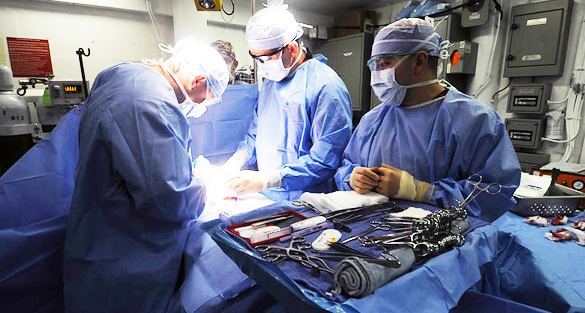When someone wakes up during surgery early it is called “accidental awareness.” As one can imagine, it can be a very traumatic experience. A new study documents the experience, and based off of that, one researcher has suggested that alien abduction experiences could be suppressed memories of accidental awareness coming to the surface.
In an article posted today on Scientific American, Anne Skomorosky, likens the experience of accidental awareness to that of the experiences described by Betty and Barney Hill, the first reported alien abductees.
Skomorowsky practices Psychosomatic Medicine at the New York-Presbyterian Hospital, and is an Assistant Professor of Psychiatry at Columbia University. The study she references was recently released by the Royal College of Anaesthetists.
Betty and Barney Hill made news in 1961 when they reported being abducted by strange beings in Franconia Notch, New Hampshire. They describe watching a light in the sky as they traveled home from a trip. After awhile they thought they had lost it, when suddenly it was blocking their path in the road. They then cannot account for a period of time after this. These details were not included in Skomorowsky’s theory. However, what the Hills remembered about the event under hypnosis was.
An excerpt of Betty’s hypnosis transcript included in Skomorowsky’s article describes a medical examination, “So then they roll me over on my back, and the examiner has a long needle in his hand. And I see the needle. And it’s bigger than any needle that I’ve ever seen.”
Skomorowsky also noted that when asked, Barney did say his experience was similar to his prior tonsillectomy. Barney had said, “Like that, but my eyes are closed, and I only have mental pictures. And I am not in pain. And I can feel a slight feeling. My groin feels cold.”
Under hypnosis, Barney also used the phrase, “I don’t want to be operated on.”
In the study by the Royal College, they describe the effects of the trauma on those who have experienced accidental awareness. It is often not be remembered consciously after surgery, but comes back as flashbacks later in life.
One patient described a flashback: “It struck again days later as horrifying images and terror that rose from the depths of my being. I was once again in the grips of horror, again not comprehending, again trapped, again struggling to survive, yet wishing for death.”
Skomorowsky says, “Alien abduction seems almost restful in comparison.”
However, anyone who has watched some of the more traumatic alien abduction hypnosis sessions would note that it is similar to the trauma recalled by the patient in the quote. Skomorowsky might argue that is because it might not be aliens, but human doctors that are causing this trauma, and the patient is misinterpreting their experience as an alien abduction when it was actually the suppressed memory of an accidental awareness experience.
Still, Skomorowsky admits, “most patients who experience awareness never claim they were abducted by aliens.”
In fact, she doesn’t reference any awareness patients that have claimed to have been abducted by aliens. Furthermore, she says, “none of the hundreds of patients interviewed for the new report did—but the Royal College report documents the potential for lasting, perhaps permanent, psychological damage to afflicted patients.”
She says, “Over 40 percent of the patients studied for the report experienced moderate to severe psychological harm, with some incapacitated by post-traumatic stress disorder.”
Alien abduction researchers claim similar effects to abductees.
Skomorowsky goes on to draw other similarities between the Hill’s memory recall and those who experience accidental awareness, and ultimately that studying the later can help in the research of “trauma memory.”
She says, “Everyday memories are not terribly descriptive. Intense emotional states, such as those experienced during awareness, create memories that are rich in sensory detail and tend to burst out inappropriately, as in a flashback. Trauma memories are not encoded as logical narratives, but as globs of sensation.”
Anyone who has seen the movie Fire in the Sky, based off of the story of Travis Walton, who was allegedly taken onboard an alien spacecraft in 1975, may recall how the movie portrayed his memories coming back in a similar fashion.
While Skomorowsky makes a very interesting observation, and a good argument that some alien abduction experiences may be misinterpretations of instances of accidental awareness, her theory does not fully explain the Hill’s experience. Not only did the Hills see a UFO before their experience, they also both had the experience at the same time. Would that make this the first instance of dual accidental awareness?
The Hills were regressed separately, but had similar memoires. How could their jumbled traumatic memories be so similar?
The other aspects that do not fit this theory are the other memories they recalled in their hypnosis sessions, such as Betty’s recollection of having a conversation with their alleged captors.
A commenter made another observation: “It seems to me that for this hypothesis to be true, we need data that these abductees all had some type of anesthetic in their lives which would have supplied the basis for this ‘flash-back’ abduction type of experience.”
Skomorowsky poses a very interesting theory, and perhaps one that will help alien abduction researchers identify if some of their patience might be misinterpreting their terrifying experiences.
